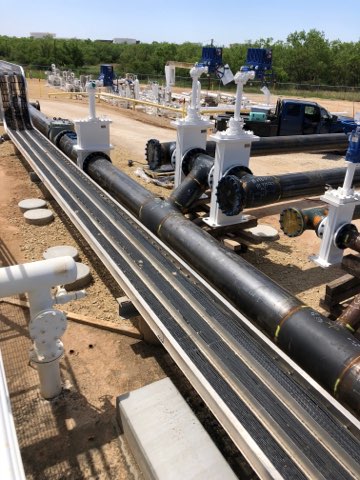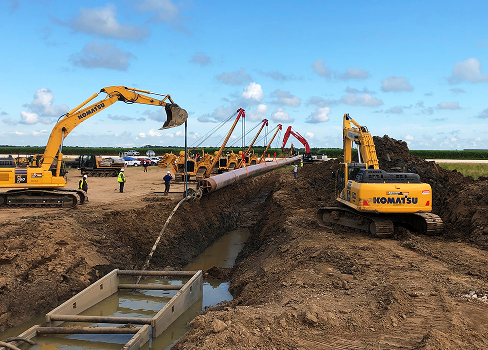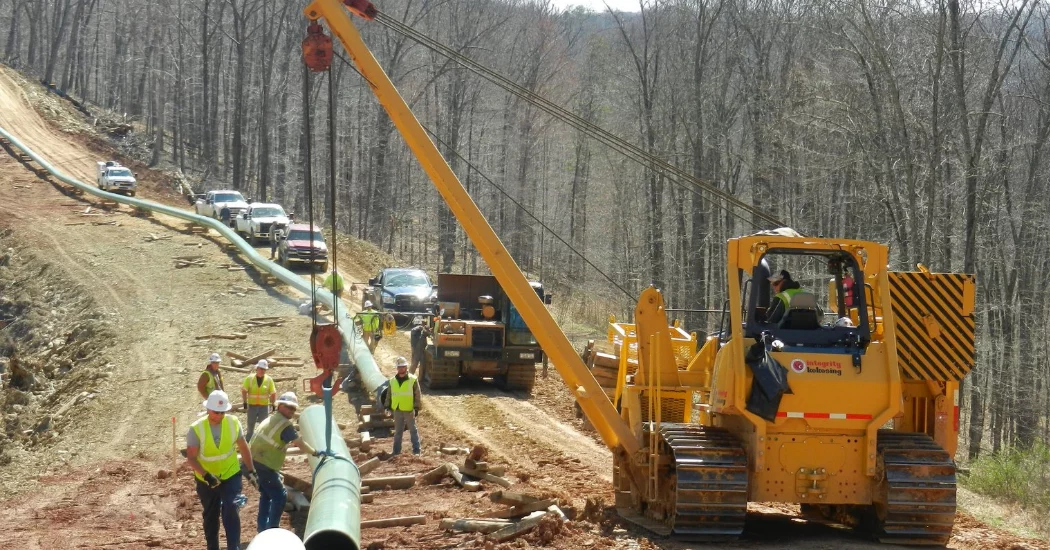Pipeline Construction Services Checklist: From Planning to Completion
The Crucial Guide to Comprehending Pipeline Construction Services and Their Value
Pipeline Construction services are essential to the transportation of essential resources such as gas, water, and oil. These solutions involve meticulous planning and execution, sticking to rigid security and ecological standards. As the market adapts to modern-day challenges, comprehending its ramifications and elements becomes progressively crucial. What variables add to the growing relevance of these solutions in today's economy? The following sections will certainly explore these important facets.
Overview of Pipeline Construction Providers
Pipeline Construction solutions incorporate a series of tasks important for the setup and upkeep of pipelines utilized to deliver numerous materials, consisting of oil, water, and gas. These services are crucial for ensuring the efficient and risk-free activity of sources from one place to one more. The process usually begins with complete planning and design, which takes into account governing needs, ecological considerations, and logistical challenges.
As soon as preparation is full, excavation and grading of the land are carried out to prepare the site for Pipeline installment. This is followed by the real laying of the pipelines, which includes welding or joining areas together to create a constant flow course. After setup, rigorous screening is executed to ensure integrity and safety and security. Maintenance solutions are additionally given to deal with any kind of problems that might emerge gradually. Generally, Pipeline Construction solutions play an essential function in supporting framework for energy and water circulation.
Key Parts of Pipeline Construction
An effective Pipeline Construction project depends on several vital parts that guarantee the efficient and safe installation of the Pipeline system. Initially, complete site analyses are vital, as they identify the ecological and geographical factors that might affect Construction. Next, the choice of ideal products, such as pipelines and fittings, is essential for securing toughness and compatibility with the delivered substances.
Furthermore, advanced Construction methods, including trenchless technology and directional boring, improve effectiveness and lessen environmental influence. Effective job administration is another crucial component, collaborating labor, devices, and timelines to meet project objectives.
Additionally, communication among stakeholders, including designers, contractors, and regional authorities, warranties positioning on job requirements and needs. Lastly, complete quality control steps throughout the Construction process make certain conformity with market criteria and take full advantage of the Pipeline's operational life-span. Jointly, these components develop the foundation of an effective Pipeline Construction project.
Safety And Security Specifications and Laws in Pipeline Construction

Boosting Regulative bodies, such as the Occupational Security and Health And Wellness Management (OSHA) and the Pipeline and Hazardous Products Safety And Security Management (PHMSA), stated specific demands that control Construction methods. These include methods for devices usage, employee training, and emergency situation reaction procedures. By applying these standards, Construction companies not just secure their employees yet additionally secure public trust. Inevitably, extensive safety actions add to the lasting success of Pipeline jobs, guaranteeing they satisfy both ecological and operational assumptions.
Environmental Factors To Consider in Pipeline Projects

Environmental considerations are essential to the planning and execution of Pipeline tasks. These jobs must evaluate potential effect on ecosystems, water resources, and regional wild animals. Conducting complete ecological impact evaluations (EIAs) is crucial, permitting stakeholders to identify and reduce dangers prior to Construction starts.
Shielding sensitive areas, such as environments and wetlands, frequently needs applying details design features or alternative routing to reduce interruption. Furthermore, Pipeline drivers are charged with establishing methods for preventing spills and leaks, which can have destructive impacts on the atmosphere.
Interaction with regional neighborhoods is vital, as public worries can cause job adjustments that improve environmental management. Compliance with regulations set by environmental agencies guarantees that tasks fulfill sustainability requirements, promoting a balance in between facilities requirements and ecological conservation. Inevitably, attending to environmental considerations not only safeguards nature yet likewise promotes area depend on and job viability.
The Role of Innovation in Pipeline Construction
Technology plays a vital role in modern-day Pipeline Construction, improving efficiency and precision. Advanced checking techniques permit specific planning and implementation, minimizing ecological impact and task hold-ups. In addition, the assimilation of automation and robotics improves operations, reducing labor prices and enhancing safety and security on Construction sites.
Advanced Evaluating Techniques
Advanced checking strategies play a necessary role in the successful implementation of Pipeline Construction projects. These techniques utilize innovative modern technology to guarantee exact mapping and analysis of the surface where pipes will be installed. Methods such as Geographic Details Systems (GIS), LiDAR (Light Detection and Ranging), and 3D modeling allow designers to visualize and evaluate the landscape, identifying environmental issues and prospective barriers. By making use of these advanced tools, teams can enhance accuracy ready and positioning, considerably lowering the threat of mistakes throughout Construction. Additionally, real-time data collection allows for immediate adjustments and informed decision-making throughout the project lifecycle. Ultimately, these surveying advancements add to enhanced effectiveness, security, and sustainability in Pipeline Construction efforts.
Automation and Robotics

Economic Effect of Pipeline Infrastructure
Pipeline framework plays an essential duty in forming regional economic situations and assisting in trade. By providing a reliable methods of delivering oil, gas, and other products, pipes minimize transport costs and boost supply chain efficiency. This facilities brings in investment, boosts task production, and fosters financial development in surrounding locations.
Moreover, the Construction and maintenance of pipes contribute significantly to neighborhood economies, producing countless employment possibility in numerous sectors, from engineering to labor. The increase of jobs typically leads to raised investing in local companies, even more strengthening financial task.
In addition, pipelines improve power protection by making certain a stable supply of sources, which is crucial for domestic needs and industrial operations. As regions become interconnected via Pipeline networks, they get to more comprehensive markets, raising competition and financial durability. view it As a result, the economic impact of Pipeline infrastructure is complex, affecting both prompt local economies and wider local advancement.
Future Trends in Pipeline Construction Providers
The future of Pipeline Construction services is evolving in feedback to technological advancements, governing modifications, and growing ecological factors to consider. Advancements such as drones and robotics are simplifying evaluation and upkeep processes, enhancing security and efficiency. Automation is positioned to reduce labor expenses and increase accuracy in Construction procedures. Furthermore, the raising emphasis on sustainability is motivating companies to embrace environmentally friendly products and practices, lining up with international efforts to minimize carbon impacts.
Regulatory structures are additionally adapting to attend to ecological impacts, pressing for better transparency and responsibility in Pipeline projects. Moreover, the integration of smart modern technologies, including real-time tracking systems, go to my site is anticipated to boost the reliability and performance of Pipeline networks. As power demands shift toward eco-friendly resources, Pipeline Construction solutions will likely see a rise in projects associated to biofuels and hydrogen transport. Generally, these fads show a transformative duration for the Pipeline Construction industry, concentrated on development and sustainability.
Often Asked Concerns
What Kinds of Pipelines Are Generally Created?
Various types of pipes are commonly constructed, including oil, water, gas, and sewage pipes - Pipeline Construction Services. Each offers distinctive purposes, helping with the transportation of important resources across regions while adhering to safety and security and environmental regulations
How Lengthy Does a Common Pipeline Task Take?
The period of a typical Pipeline project varies greatly, often ranging from a number of months to a couple of years. Factors affecting this timeline consist of project intricacy, governing approvals, and environmental factors to consider that need to be dealt with.
Who Manages Pipeline Construction Companies?
Pipeline Construction firms are managed by various federal, state, and regional agencies, consisting of the Pipeline and Hazardous Materials Safety And Security Administration (PHMSA) and state utility compensations, ensuring conformity with safety and ecological standards throughout the Construction procedure.
What Are Common Products Used in Pipeline Construction?
Typical materials utilized in Pipeline Construction consist of polyethylene, pvc, and steel. Each material uses distinctive advantages such as flexibility, resistance, and toughness to rust, making them ideal for various applications in carrying liquids and gases.

How Are Pipeline Construction Expenses Estimated?
Pipeline Construction prices are estimated by assessing aspects such as material expenditures, labor rates, task complexity, ecological factors to consider, and regulative needs (Pipeline Construction Services). Precise price evaluation warranties efficient budgeting and project planning throughout the Construction procedure
Pipeline Construction services include a variety of activities crucial for the installment and maintenance of try this web-site pipelines made use of to transport different materials, consisting of water, gas, and oil. A successful Pipeline Construction project depends on a number of crucial parts that assure the safe and effective setup of the Pipeline system. Advanced checking methods play a necessary duty in the effective implementation of Pipeline Construction tasks. Numerous kinds of pipes are generally created, consisting of oil, water, sewage, and gas pipelines. Pipeline Construction costs are estimated by analyzing factors such as product expenditures, labor prices, job intricacy, environmental considerations, and regulatory requirements.